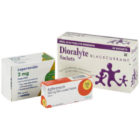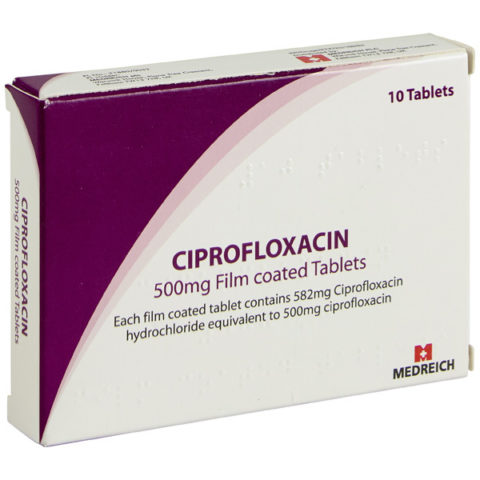
Ciprofloxacin 500mg Tablets

* The brand supplied may vary. Please contact us if you require a specific brand.
- Includes free private prescription
- Free delivery over £40
- 100% UK-based pharmacy
- Free advice and support
- We're rated 4.9 out of 5
Ciprofloxacin for Travellers' Diarrhoea
| Type of medicine | Antibiotic |
| Works by | Killing the bacteria responsible for the infection and stop it spreading |
| Active ingredient | Ciprofloxacin |
| Effective within | 1 day |
| Pack size | 6 tablets |
| Strength | 500mg |
| Common side effects | Nausea, Diarrhoea, Joint Pain |
| Manufacturer | Dr. Reddy's Laboratories, Aurobindo Pharma - Milpharm, and other manufacturers |
| Generic | Yes |
| Use with alcohol | No known issues |
We stock 2 different variants of Ciprofloxacin 500mg Tablets
Ciprofloxacin Information
How does Ciprofloxacin treat travellers' diarrhoea?
Travellers' diarrhoea can be a real pain, especially if you are in a location that is far away from any kind of medical treatment. Ciprofloxacin is an effective antibiotic treatment for killing the bacteria associated with travellers' diarrhoea.
Ciprofloxacin is a kind of antibiotic known as a “quinolone antibiotic”. It is in no way related to penicillin. It is important to note that Ciprofloxacin should only be used to treat the symptoms of travellers' diarrhoea – it should not be used as a preventative measure.
Ciprofloxacin can be used to treat a wide variety of bacterial infections, one of which is travellers' diarrhoea. As an antibiotic, Ciprofloxacin will attack the dangerous bacteria infecting your body, preventing them from spreading and ultimately killing them off. When Ciprofloxacin attacks the bacteria, it prevents them from producing an enzyme that they require to live and reproduce. This leaves the bacteria wide open to attack from your body’s natural defences.
Ciprofloxacin can effectively reduce the duration of your traveller’s diarrhoea, as well as the symptoms associated with it. This effectiveness can be enhanced by the anti-diarrhoea drug loperamide. For best results, you should take Ciprofloxacin twice a day for three days.
What countries is Ciprofloxacin recommended for use in TD?
It is an ideal solution for travellers and works on the common types of bacteria found in most countries around the world, except South Asia (such as India and Pakistan) and South East Asia (including Thailand, Vietnam, Cambodia, Laos, & Myanmar) - for these areas, Azithromycin is the preferred antibiotic
What is travellers' diarrhoea?
Common throughout the world, travellers' diarrhoea is a condition in which stools will be passed frequently. This is usually a result of consuming some kind of food or drink which has been contaminated with bacteria, viruses, or parasites.
The condition can be very unpleasant and can get in the way of day-to-day life – this is especially true when travelling. Though uncomfortable, the condition is nothing to worry about and will usually pass within a few days.
Important Information
Your symptoms should begin to improve within 24 hours of taking Ciprofloxacin. Its effectiveness can be increased when used in conjunction with Loperamide. If used in conjunction with anti-sickness tablets, such as Avomine, you can help to reduce your fluid loss and general discomfort.
Ciprofloxacin tablets should not be taken if:
- You are allergic to any of the ingredients
- You have kidney problems
- You have epilepsy
- You suffer from muscles weakness
- You have a history of irregular heart rhythms
When taking Ciprofloxacin your skin will become more sensitive to UV rays from the sun. For this reason, it is advised that you avoid exposure to direct sunlight, as well as UV lamps, as much as possible. When you must go into the sun it is recommended that you used sun protection. If you notice any changes in your skin as a result of being in sunlight you should contact your doctor immediately.
In some cases, patients will develop a condition known as crystalluria in which they pass small crystals in their urine. If you notice this you should make sure you are drinking plenty of water and contact your doctor if necessary.
Ciprofloxacin may give a false test result for tuberculosis.
Always inform your doctor as to any medications you are currently taking or have recently taken. Some substances within the blood can be increased if using Ciprofloxacin, these are:
- Agomelatine
- Zolpidem
Take special care if you are using Ciprofloxacin at the same time as any of the following medications:
- Methotrexate (for certain types of cancer, psoriasis, and rheumatoid arthritis)
- Vitamin K antagonists (e.g. warfarin)
- Probenecid (for gout)
- Theophylline (for breathing problems)
- Phenytoin (for epilepsy)
- Metoclopramide (for nausea and vomiting)
- Tizanidine (for muscle spasticity in multiple sclerosis)
- Anti-arrhythmic medications
- Tricyclic antidepressants
- Some antimicrobials (that belong to the group of macrolides)
- Ropinirole (for Parkinson’s disease)
- Cyclosporin (for skin conditions, rheumatoid arthritis and in organ transplantation)
- Some antipsychotics such as olanzapine and clozapine
Blood levels of certain medications can be increased when using Ciprofloxacin, these include:
- Lidocaine (for heart conditions or anaesthetic use)
- Pentoxifylline (for circulatory disorders)
- Caffeine
- Duloxetine (for depression, diabetic nerve damage or incontinence)
- Sildenafil (e.g. for erectile dysfunction)
Certain medications can also reduce the effects of Ciprofloxacin, these include:
- Antacids
- Omeprazole
- Mineral supplements such as calcium, iron and magnesium
- Sucralfate
- Polymeric phosphate binders such as sevelamer and lanthanum carbonate
If you must take any of these medications then it is advised that you wait at least 2 hours before or after taking Ciprofloxacin.
You should always read all available packaging and product information before beginning a new medication.
Pharmacist Tip:
Avoid dairy products as much as possible while taking Ciprofloxacin. You should also avoid anything which contains high levels of magnesium, calcium, iron, or aluminium such as antacids or supplements at least 2 hours before or after each dose of Ciprofloxacin.
OTC (over-the-counter medication) alternative for Travellers' Diarrhoea
In some more simple cases, travellers' diarrhoea can be treated with over-the-counter medicines. These medicines include Loperamide (Imodium) and rehydration sachets (Dioralyte). Using these products together will help ease the symptoms, and this will help as your body is trying to fight off the infection. You must also ensure you remain hydrated so take on as much fluids as possible during this time, as dehydration is the most dangerous consequence of travellers' diarrhoea.
Ciprofloxacin warnings
Before using Ciprofloxacin you should read the following warnings carefully:
Ciprofloxacin should not be used if you or your child:
- Have ever had an allergic reaction to any of the ingredients listed above
- Have ever had an allergic reaction to any other quinolone antibiotics
- Are currently taking tizanidine
Before using Ciprofloxacin you should talk to your doctor if you:
- Have ever had any issues with your kidneys
- Suffer from neurological conditions such as epilepsy
- Have had problems with your tendons when using other antibiotics
- Have diabetes as this can increase the risk of hypoglycaemia
- Have myasthenia gravis (a type of muscle weakness)
- Have heart problems
- Have a family history of prolonged AT intervals (from an ECG)
- Have a salt imbalance
- Have a slow heart rhythm
- Have a weak heart of history of heart attacks
- Have a family member with a glucose-6-phosphate dehydrogenase (G6PD) deficiency as this can lead to anaemia
You should cease usage and contact your doctor if any of the following occurs:
- Severe allergic reaction to the drug. Symptoms include: tightening of the chest, dizziness, sickness, and feeling faint.
- You experience any loss of vision or impairment of sight.
- You experience pain and even swelling in the joints (particularly your Achilles tendon – this is more likely to happen if you are older.
- You have an epileptic seizure or any other neurological conditions such as stroke or ischemia.
- It is possible that you may develop some adverse psychological reactions when using Ciprofloxacin for the first time. If you already have depression or psychosis then Ciprofloxacin may make these symptoms worse. In some rare cases this can lead to risks of suicidal thoughts and eventually suicide.
- You experience hypoglycaemia (a lack of sugar in the bloodstream).
- If you develop severe or bloody diarrhoea as a result of using Ciprofloxacin.
- Symptoms such as jaundice, loss of appetite and dark urine could indicate liver damage.
- If you have a fever or your general condition deteriorates you may have reduced levels of white blood cells.
Always inform doctors as to any medications you have taken.
Ciprofloxacin dosage for travellers' diarrhoea
How to take Ciprofloxacin tablets (antibiotics)
- Take one tablet twice daily, roughly 12 hours apart.
- You should always continue the course until it is complete unless otherwise directed by a doctor.
- You should start taking Ciprofloxacin as soon as you recognize the symptoms of traveller’s diarrhoea such as diarrhoea, nausea, sickness, and stomach cramps.
- You should try to avoid food and drink containg high levels of calcium or iron (e.g. dairy products, red meat) at least 2 hours each side of taking Ciprofloxacin. You should also try to avoid antacids for the duration of your treatment.
How to take Loperamide capsules (anti-diarrhoeals)
- Take two capsules at the onset of diarrhoea, followed by a further capsule after each loose bowel movement.
- You should never take more than 8 capsules in 24 hours.
How to take Dioralyte sachets (rehydration sachets)
- Dissolve the contents of one sachet in roughly 200mL of fresh drinking water. Where fresh drinking water is unavailable, you should use water that has been freshly boiled and cooled.
- The solution should be made up immediately before use and consumed within one hour. If it is possible to refrigerate the mixture it can be stored for up to 24 hours.
Ciprofloxacin ingredients
Ciprofloxacin 500mg tablets contain one active ingredient:
- Ciprofloxacin hydrochloride
Ciprofloxacin 500mg tablets also contain several inactive ingredients:
- Maize starch
- Microcrystalline cellulose
- Sodium starch glycolate
- Anhydrous colloidal silica
- Magnesium stearate
- Hypromellose
- Macrogol 400
- Titanium dioxide (E171).
Ciprofloxacin side effects
Most people will not experience any side effects when using Ciprofloxacin, however approximately 1 in 10 people might experience the following symptoms:
- Nausea
- Diarrhoea
- Joint pain
Please read the Patient Information Leaflet for a full list of side effects.
If you have any concerns regarding these side effects, or any of the information listed in the Patient Information Leaflet, speak to your doctor or pharmacist.
Ciprofloxacin 500mg Tablets reviews
Ciprofloxacin 500mg Tablets FAQs
Ciprofloxacin is the best antibiotic to use in most regions around the world. Ciprofloxacin should not be used in South Asia, for example India and Pakistan, or South East Asia, such as Cambodia, Vietnam, Thailand, Laos, & Myanmar. In these regions the recommended treatment is Azithromycin due to resistance to Ciprofloxacin.
Ciprofloxacin is an antibiotic that belongs to the quinolone family. As an antibiotic it is used as a treatment for bacterial infections, especially within the chest, stomach, and urinary tract.
Ciprofloxacin kills harmful bacteria within your body by attacking their cells directly. By preventing the bacteria from producing an enzyme known as DNA-gyrase, Ciprofloxacin is able to stop the bacteria from spreading, causing them to die.
Women who are pregnant or currently breast feeding should not use Ciprofloxacin. You should also avoid Ciprofloxacin if you are allergic to any of the ingredients contained within it.
You should consult your doctor before taking Ciprofloxacin if:
- You are over 60
- You have had an organ transplant
- You have poor kidney function
- You have a history of brain or nervous system disorders
- You are taking corticosteroids.
Dairy products such as milk, cheese, and yogurt should be avoided, as well as any excess calcium in the form of supplementation. Other supplements, such as magnesium, iron, and aluminium should be taken at least two hours before or after Ciprofloxacin.
You can take Ciprofloxacin twice a day for a maximum of three days. Ciprofloxacin should be taken only once diarrhoea has started, not as a preventative measure.
You should see an improvement in your symptoms within 24 hours of taking Ciprofloxacin. If your symptoms do not improve, or worsen, you should seek medical advice. You should also seek medical advice if any of these things occur:
- Excessive diarrhoea or vomiting, leading to dehydration
- Bloody or mucus-filled stools
- Severe abdominal pain
- High fevers or severe headaches
You can use Loperamide alongside Ciprofloxacin in order to reduce the symptoms of diarrhoea. At the same time, make sure you are drinking plenty of fluids, even if you are continuing to vomit – at least 3 litres a day. Eat simple food such as bread and rice as much as possible. You should also pay special attention to your personal hygiene to avoid the spreading of the bacteria.
Still unsure about this treatment?
Ask our medical team for impartial information and advice about any treatment we provide or medical condition that we treat before you buy.
Related Treatments for Travellers' Diarrhoea
We stock 2 other treatments for Travellers' Diarrhoea
How to order treatment from our online pharmacy
Need something else?
We stock 857 treatments for 86 conditionsOr browse all treatments or conditions


